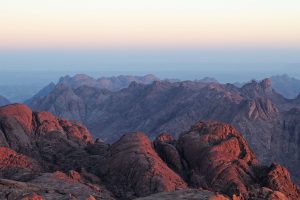Arkiv, Høytlesning
Desert Fathers 47
You can find this episode in video format here – a dedicated page – and pick it up in audio wherever you listen to podcasts. On YouTube, the full range of episodes can be found here.
About Abba Netras, the disciple of Abba Silvanos, it was said that he, as long as he lived in his cell on Mount Sinai, paced himself reasonably on account of the needs of the body. But when he became bishop of Pharan, he began to drive himself very hard. So his disciple said to him: ‘Abba, when we were in the desert, you did not practise this kind of asceticism.’ The elder said to him: ‘There we had the desert, and peace [hesychia], and poverty. I wished to manage my body in such a way that I would not fall ill and start looking for what I had not. Now, though, we have come into the world and are surrounded by many temptations. For that reason I chastise my body in order not to put to death the monk [in me]. And should I fall ill here, there will be somebody at hand to assist me.’
When illness came their way, the Fathers received it as a welcome guest, even as they opened their heart’s door hospitably to Sister Death, the pasch by which they would enter eternal life and know the fulfilment of their earthly striving. They believed in divine providence. It would not occur to them, if they were true to their habit, to murmur at any trial that came their way as gift. They would, however, remonstrate with anyone who, for want of prudence, brought harm upon himself or herself.
To visit the sick is a corporate work of mercy, a Gospel commandment. St Benedict prescribes it in his Rule as a monastic observance. If a monk in the Desert fell ill, his neighbours would be obliged to care for him. Abba Netras, for as long as he lived on Sinai, an inaccessible place, would spare his brethren such inconvenience. He lived therefore with moderation and did not take austerities too far, to spare himself worry and others trouble, thus to be able to live peacefully, offering up a constant sacrifice of praise in the very place where God had deigned to make his presence felt to the people of Israel. The hardships and graces of Sinai were sufficient to keep him, there, on the straight and narrow. There was no chance of indulging in luxury: life was materially poor. Spiritually, it was rich by virtue of the incomparable stillness the desert offers, teaching a man to become a hesychast.
Netras was not permitted to remain in this blessed state. Not in the form of sickness did providence visit him, but through a call, administered through holy Church, to a different state of life. Netras was made bishop of Pharan, the main urban centre of the Sinai peninsula in Roman times — the Wadi Feiran of modern Arabic. Compelled to descend from the mountain into the plain, he was obliged to tear himself away from the embrace of Rachel, a symbol of the contemplative life since Origen, to enter the fray that constitutes a bishop’s ministry, made up of countless daily demands and distractions, and necessarily exposed to a degree of worldliness.
In the context of this shift, Bishop Netras chose to organise life differently. He, who had been a paragon of reasonableness, started to practise strict fasts and vigils. One might have expected him to the opposite, assuming a grand public persona. Many would have expected him to do so. But instead of relaxing, he got tougher on himself. This is what caused the brother who lived with him in the bishop’s palace, even as he had shared his life on Sinai, to be thoughtful. He could not see the logic of Netras’s comportment, so asked: What, Father, is this new observance about?
Netras’s answer springs from both realism and self-knowledge. As long as his context of life rendered extravagance impossible, he did not need to look for supplementary mortification. The desert, in its poverty and quiet, had served as guarantor of monastic probity. His removal to the city changed all that. There was no longer a regular life to ensure an equilibrium of activity and prayer. Local grandees, such as they were, would invite him to parties. Some people would flatter him, others would deplore him. Staying spiritually on an even course, which on Sinai had felt almost automatic, was no longer easy. Netras experienced the need for props he had not required before. Consequently he took measures, keeping outward temptations in check by greater inward rigour. Explaining this to his brother, he said he did not wish to put to death the monk in himself. It was as a monk that he had been called to serve as bishop; for him to serve well, the monk must keep alive.
Netras does not moan about the part entrusted to him. He would no doubt have thought as Archbishop Cyril of Alexandria did when an abbot asked him: ‘Who is greater in his state of life, the likes of us, who have lots of brothers placed under our care whom we lead, each according to his need, towards salvation, or those who in desert places work out their own salvation?’ Cyril answered: ‘Why wedge apart Elijah and Moses, seeing that they were both well-pleasing to God?’ This exemplifies discernment of the kind the Fathers counselled: an ability to see things and situations as they are, without illusions but also without melodrama, trusting that God’s provident grace can draw blessings out of everything as long as we take right measures to stay faithful and attentive where we happen to be, keeping alive our deepest, truest self, the one that grows and blossoms out of God’s call.

The landscape around Mount Sinai. Wikimedia Commons.
